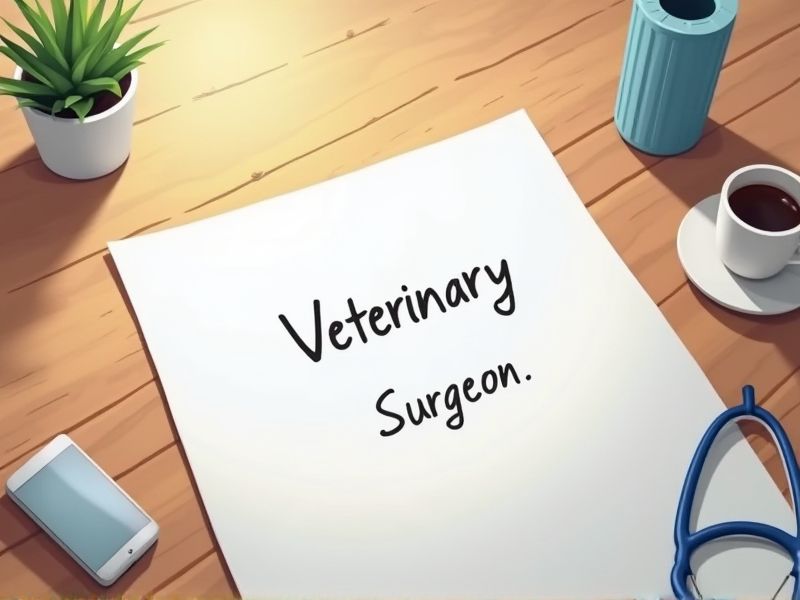
The role of a Veterinary Surgeon involves diagnosing, treating, and performing surgeries on animals, necessitating a high level of expertise and accuracy. Certification ensures that veterinarians possess the required knowledge to practice safely and adhere to industry standards. Obtaining specific certifications equips surgeons with specialized skills, enhancing their ability to handle complex cases. Some important certifications to consider for Veterinary Surgeons include the following.
Doctor of Veterinary Medicine (DVM)
A Doctor of Veterinary Medicine (DVM) provides the comprehensive education required to understand animal anatomy and physiology, which is foundational for performing surgery. The DVM curriculum equips future veterinary surgeons with critical diagnostic skills and knowledge of surgical techniques. Without a DVM, practical experience through clinical rotations and exposure to a variety of species would be lacking, hindering effective surgery. Professional licensing bodies require a DVM to ensure standardized competence and adherence to ethical practices in veterinary surgery.
Veterinary Medical License
A Veterinary Medical License is essential for a veterinary surgeon to ensure they meet the professional standards necessary for animal healthcare. Licensing verifies the surgeon's qualifications, providing assurance to pet owners and regulatory bodies that they possess the required skills and knowledge. The license also plays a crucial role in maintaining public trust and safety by ensuring that veterinary practitioners adhere to ethical and legal standards. Unlicensed practice could lead to legal consequences and pose risks to animal welfare due to potential incompetence or malpractice.
American College of Veterinary Surgeons (ACVS) Board Certification
ACVS Board Certification signals advanced expertise and skill in veterinary surgery, ensuring adherence to high professional standards. This certification provides pet owners confidence in the surgeon's ability to perform complex procedures safely and effectively. Being board-certified also opens up opportunities for professional growth and specialization, contributing to career advancement. Veterinary surgeons with ACVS certification are more likely to be trusted for referrals from other veterinarians, expanding their network and client base.
American College of Veterinary Emergency and Critical Care (ACVECC) Certification
ACVECC Certification ensures that a veterinary surgeon possesses specialized knowledge in handling critical and emergency situations, which is crucial for patient survival in life-threatening conditions. It signifies a commitment to the highest standards of veterinary care, boosting client trust and confidence in the surgeon's abilities. The certification provides a framework for ongoing education and skill development, enhancing a surgeon's expertise in new and evolving emergency care techniques. Employers often seek veterinarians with ACVECC Certification to improve their practice's ability to handle a wider range of emergency cases effectively.
Advanced Certificate in Veterinary Orthopedic Surgery
Veterinary surgeons often encounter complex orthopedic cases that require specialized skills, leading to an increased demand for advanced certification in veterinary orthopedic surgery. Possessing such credentials allows surgeons to incorporate innovative techniques and improve surgical outcomes for animals. The certification ensures a deeper understanding of musculoskeletal disorders, facilitating accurate diagnostics and effective treatment plans. Enhanced knowledge gained through this certification aids in ensuring animal welfare and promoting recovery in the veterinary field.
Advanced Certificate in Veterinary Soft Tissue Surgery
The need for an Advanced Certificate in Veterinary Soft Tissue Surgery arises from the complexity of surgical conditions affecting animal soft tissues, which often require specialized knowledge and skills. Without this advanced training, veterinary surgeons may struggle to provide effective treatment for cases that involve intricate anatomical structures. Such certification ensures that veterinarians are equipped with the latest surgical techniques and evidence-based practices, improving patient outcomes. Moreover, it enhances the veterinarian's credibility and capability, which is crucial for career advancement and client trust.
Certification in Veterinary Anesthesia and Analgesia
Certification in Veterinary Anesthesia and Analgesia ensures a veterinary surgeon has specialized knowledge to safely manage anesthesia in various animal species, which reduces the risk of adverse events during surgical procedures. It provides vets with advanced skills in pain management, critical to improving animal welfare post-surgery. The certification distinguishes a surgeon's expertise, increasing trust from pet owners and enhancing professional opportunities. Complex surgical cases often require nuanced anesthetic techniques, which certified vets are better equipped to handle, improving overall surgical outcomes.
Certification in Minimally Invasive Veterinary Surgery
The demand for certification in minimally invasive veterinary surgery arises from an increased focus on reducing recovery times and pain management in animals. Advancements in surgical technology necessitate specialized skills, which certification provides, ensuring veterinary surgeons can adeptly perform these techniques. Pet owners increasingly seek veterinarians with proven expertise, driving the need for certified professionals in this growing area of veterinary care. The certification establishes a standardized level of knowledge, fostering improved surgical outcomes and enhancing the overall trust in veterinary services.
Veterinary Pain Management Certification
Veterinary Pain Management Certification ensures veterinarians possess specialized skills for effective pain control, improving animal welfare and recovery outcomes. Pain management knowledge reduces surgical complications, enhancing the overall success rate of veterinary procedures. Clients increasingly demand higher standards of animal care, and certified professionals meet this expectation. Certified veterinarians contribute to advances in veterinary medicine by adopting latest evidence-based pain management strategies.
Certification in Exotic Animal Surgery
Certifications in Exotic Animal Surgery equip veterinary surgeons with specialized skills necessary for the unique anatomical and physiological challenges presented by exotic animals. As the demand for exotic pets rises, certified veterinarians are better positioned to meet the healthcare needs of these species. This certification ensures that a veterinarian is current with the latest surgical techniques and ethical practices related to exotic animals. Enhanced skills from certification can lead to improved surgical outcomes and overall animal welfare.
Summary
When you, as a Veterinary Surgeon, gain additional certifications, your credibility within the profession typically increases. Clients generally perceive you as more knowledgeable, often leading to greater trust and more consultations. Enhanced skills from certifications usually improve patient outcomes, frequently boosting client satisfaction. This continuous professional development generally opens new career opportunities and can result in higher earnings.
